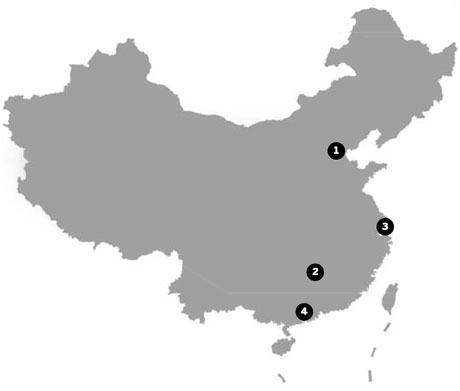Economy
IP Scene
(China Daily)
Updated: 2011-02-23 11:06
 |
Large Medium Small |

1. Beijing
SIPO summarizes last year and plans out 2011 work
The State Intellectual Property Office (SIPO) released two draft documents at a Feb 16 meeting to collect opinions and consider amendments.
One of the drafts is the summary of achievements in intellectual property in 2010 and the other outlines working arrangements this year.
More than 70 senior officials from 28 central government departments took part in the gathering, with most of them voicing their opinions.
SIPO plans to host another conference before submitting the documents to the State Council, according to its Vice-Commissioner Gan Shaoning.
Information ministry, Intel join together for IPR training
The Ministry of Industry and Information Technology's Intellectual Property Center and Intel China Ltd signed a memorandum of understanding on strategic cooperation last week.
The partnership is a new move after their joint launch of a two-year training program in late 2008 to promote awareness of intellectual property rights (IPR), especially among small businesses.
The agreement will promote training of IPR staff and improve intellectual property awareness and management in industry, Han Jun, deputy director of the ministry's Department of Science and Technology, said at the signing ceremony.
Ge Jun, Intel China's executive director, said he hopes the combined effort will contribute to building a better environment for business innovation through joint research into pressing IPR issues.
60b yuan bank agreement to promote publishing sector
The General Administration of Press and Publication will receive at least 60 billion yuan ($9.1 billion) from the Industrial and Commercial Bank of China over the next five years to explore financial services for press and publishing businesses.
The agreement comes in response to the central government's call for further growth in the publishing industry.
It is the administration's fourth agreement with large State-owned banks following deals with Bank of China, Agricultural Bank of China and China Development Bank.
2. Hunan
Changsha tops provincial capitals for patents filed
With more than 9,000 filings - 6,209 of them granted - Changsha ranked at the top of provincial capitals in both applications and patents in 2010, according to recent statistics released by the city's intellectual property office.
The city's top 50 industrial and mining companies filed the majority of applications.
They ranged from businesses producing new materials, engineering machinery, automobiles and auto parts to electronic information, home appliances, biomedicine and pharmaceuticals using traditional Chinese herbs as raw materials.
They filed more than 2,200 patent applications, about 85 percent of top 50.
3. Shanghai
'Engineers' qualify for intellectual property work
More than 100 people in this eastern metropolis qualified to become patent management engineers in 2010, bringing the total number to 630.
They are mainly responsible for patent retrieval, applications and dispute resolutions, according to local authorities.
The Shanghai intellectual property administration, along with the city's human resources and social security bureau, started the examination in 2006 to include patent management in the professional system.
Four such examinations were held in Shanghai over the past five years.
4. Guangdong
Large operation making fake phones busted, two arrested
Shenzhen police recently arrested two suspects after uncovered a factory for manufacturing and selling fake mobile phones.
They seized 3,200 counterfeit phones, as well as production materials worth 1.7 million yuan ($258,000).
Police said more than 100 workers began production at the factory in April last year.
The factory had three production lines with a daily output of nearly 3,000 fake phones, most of them exported.
| 分享按钮 |